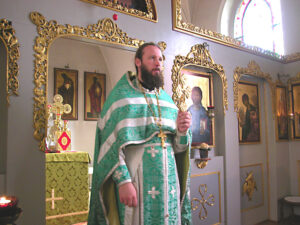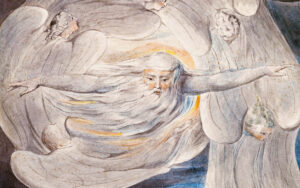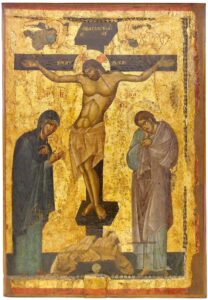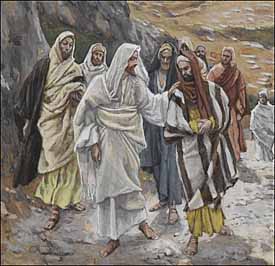 We hear these words at the end of almost all our Orthodox services. The priest begins the Dismissal: “May Christ our true God, through the intercessions of His all-pure and all-immaculate holy Mother….[and so on through the other commemorations, then] have mercy on us and save us, for He is good and loves mankind.”
We hear these words at the end of almost all our Orthodox services. The priest begins the Dismissal: “May Christ our true God, through the intercessions of His all-pure and all-immaculate holy Mother….[and so on through the other commemorations, then] have mercy on us and save us, for He is good and loves mankind.”
Through some personal connections, I know of a woman whose father died (not unexpectedly) about two years ago. Very shortly thereafter her husband died suddenly and unexpectedly in mid-life. Then a few weeks ago, her son who was at university, following in his father’s profession, was killed in a bizarre accident which has yet to be explained – so horrible that his mother received not his body intact but only his ashes. My stomach falls every time I think of it. Please pray right now for her, her husband and her son, as well as her daughter who has moved home to live with her mother. (You don’t need to know their names. God knows them.)
Were I her pastor, how far do you think I would get trying to tell her that it’s alright, because “God is good and loves mankind”?
I think we all have heard of tragedies like this. (In fact, just yesterday I met another woman who had suffered in almost exactly the same way. Now she is warm, gracious and loving. People can recover.) I sincerely hope you haven’t experienced anything like this yourself. We know the world is filled with horrors, of which the ultimate is death. (If anyone tells you death is “natural”, it is not. “Death is the last enemy to be destroyed.”) I Corinthians 15:26
My first pastoral task as a young Episcopal priest, alone and in charge of a church for the first time, was this: A young couple, members of the church, rang our doorbell. I went to the door, and there they stood barely able to talk. Their only daughter, two years old, had got sick two days before and was now dead. Inexplicably dead. I’ll never forget that tiny coffin. What was I to say to them? Should I have quoted Saint John: “God is love” or “God is light, and in Him is no darkness at all”? But they were in utter darkness. They felt totally unloved. I felt I should say something comforting, but I couldn’t think of a thing, so (wisely, as I was to discover over the years) I said almost nothing, but rather spent time with them, helping them through the “mechanics” of the funeral, and then just being with them. Our presence counts for more than our words.
There are times in life when most of us ask “Does God really care?” or “Is God even here?” It’s a natural human reaction. A Man Whom we love and follow and worship once felt the same: “My God, my God, why have You forsaken Me?” John 27:46
The Problems of Evil and Good
Let’s pretend we are not Christians. Let’s try to approach this in a solely rational way.
Would you not think that, all things considered, we would say: “Sometimes we suffer, sometimes things are good”, and settle for that? However, the fact is when things go well we take it for granted. When things go ill, we are distressed by it; it seems just wrong. This is the first piece of evidence that God created us for good things, not for evil.
However, based on the evidence alone, I think I’d conclude that God is often indifferent, or that for some reason He is good to certain people and loves them more than others – or maybe does He change His mind from time to time?
It’s the problem of evil. If God is truly good, why is there all this evil in the world?
Certainly there is also what some (Bishop Kallistos, for one) call the problem of good. If God is indifferent, then why is there is so much goodness and beauty in the world? We are surrounded, encompassed by it every day. I am sitting here right now in a comfortable chair, looking at lovely colors both indoors and outdoors , as a gentle warm early autumn breeze blows through. I’m typing on a computer…
, as a gentle warm early autumn breeze blows through. I’m typing on a computer…
Below you can see the top of the laptop where all these Posts come from.
…which brings my friends and relatives and all the world to me, and I to them. My dear wife has just now come into the living room cheerily singing something – I can’t make out what. Our immediate family has suffered no tragedies or untimely deaths. I have been very greatly blessed in so many ways. (I hope much goodness and love has surrounded you, as well.)
But then, looking at it only superficially, does that mean God loves me more than the women I described up above? or more than, say, the people of Ukraine? * That’s certainly what it looks like.
- Which reminds me that I haven’t mentioned this for a while: Please don’t forget to pray daily for the people of Ukraine, and to give to Ukrainian relief: https://support.iocc.org/site/Donation2?df_id=7543&mfc_pref=T&7543.donation=form1
When I was a pastor teaching classes, this was the question I was asked more than any other: If God is good, why is there evil in the world? Why do some people suffer so little and others so much? I think this is the single most difficult thing for Christians to understand and explain.
Muslims have a simple answer: إِنْ شَاءَ ٱللَّٰهُ (In sha’Allah) God wills it!
Buddhists don’t believe in a universal God, only in gods, so they don’t need an explanation for evil. It just is.
Nor do Hindus believe in God. As I understand it (there is much variety in Hinduism) they believe evil falls upon individuals because of their behavior either in this life or in previous lives.
Some unbelievers have become unbelievers precisely because of bad things that have happened to them, seemingly unfairly.
Many Old Testament Jews believed that evil happens to people because of their sins. Read the book of Job.
So how did Our Lord Jesus explain the existence of evil?
I’m sorry to tell you this – but He did not. If fact He refused to do so twice.
I Here was His first “non-answer”.

“Another parable He put forth to them, saying: ‘The kingdom of heaven is like a man who sowed good seed in his field; but while men slept, his enemy came and sowed weeds among the wheat and went his way. But when the grain had sprouted and produced a crop, then the weeds also appeared. So the servants of the owner came and said to him, ‘‘Sir, did you not sow good seed in your field? How then does it have weeds?’ He said to them, ‘An enemy has done this.’ The servants said to him, ‘Do you want us then to go and gather them up?’ But he said, ‘No, lest while you gather up the weeds you also uproot the wheat with them. Let both grow together until the harvest, and at the time of harvest I will say to the reapers, ‘First gather together the weeds and bind them in bundles to burn them, but gather the wheat into my barn.'” Matthew 13: 24-30
He explained why God doesn’t put an end to evil now. But why does it exist in the first place? “An enemy” did it. But why should this enemy exist? Where did he come from? Our Lord didn’t say.
2 This time He directly challenged the idea that suffering is always caused by peoples’ sins. But then He refused to explain to His disciples why some people suffer more than others. He simply turned the question back on them, without answering it.
“There were present at that season some who told Him about the Galileans whose blood Pilate had mingled with their sacrifices. And Jesus answered and said to them, ‘Do you suppose that these Galileans were worse sinners than all other Galileans, because they suffered such things? I tell you, no; but unless you repent you will all likewise perish. Or those eighteen on whom the tower in Siloam fell and killed them, do you think that they were worse sinners than all other men who dwelt in Jerusalem? I tell you, no; but unless you repent you will all likewise perish.’” Luke 13: 1-5
If we insist on having a rational Christian explanation for evil:
Here’s the only one I know. I don’t like it, but I’ll try to do it justice.
God knows joy because He is entirely free and always chooses the good. In creating us, God intends us to become “like Him” I John 3:2, be “partakers of the divine nature”. 2 Peter 1:4 “God became Man that man might become [a?] god.” Saint Athanasius That means we also must have “free will”. True freedom requires a real choice, so there must be both good and evil for us to choose from. Because other people also have free will, they sometimes choose evil, which impinges on us. This life is the beginning of our “training ground”, so that finally we may attain the fullness of life in Heaven where we will still have free will but will only have good choices, will always choose what is good.
What is evil and where does it come from? Evil is the absence of God and His goodness and love and light. In that sense evil is “nothing”. Darkness, after all, is only the absence of light – just as cold is the absence of heat.  But “nothing” is very powerful. A person can get lost in the dark – or in a Wisconsin blizzard, freeze to death in the cold.
But “nothing” is very powerful. A person can get lost in the dark – or in a Wisconsin blizzard, freeze to death in the cold.
cnn
Where does evil come from? From the Evil One, who according to tradition was an archangel who also had the same choice. He chose to turn away from God into the darkness, the cold, the nothingness. He was “cast down” to earth. Ever since, he has been the “prince of this world”, and we and the world have been as we are. Satan’s choice of evil also impinges on us, causing our sickness and suffering and death.
I hope I said that right.
However I don’t find that to be an explanation. I’m pretty sure there’s truth in there somewhere, but when someone I love suffers or dies – as a pastor I faced this again and again, and at my advanced age, I still do, regarding myself – forgive me, but I ask God: “Is this really the only way You could have created this world? If You want us to be gods and goddesses, why couldn’t You just have created us that way in the first place? Couldn’t You have done better than this?
And then I feel ashamed. Do I think I know better than God? that He doesn’t know what He’s doing? I mean, if we were able to understand, wouldn’t Christ have explained it?
Our only “explanation” for now is the answer God gave to the prophet Job. Job’s philosophical friends had kindly given their long explanations of why Job had lost everything. After they were done, Job in so many words told them to get lost. None of it made sense. Job had no answer.

“Then the Lord answered Job out of the whirlwind, and said: ‘Who is this who darkens counsel by words without knowledge? Now prepare yourself like a man; I will question you, and you shall answer Me. “Where were you when I laid the foundations of the earth? Tell Me, if you have understanding. Who determined its measurements? Surely you know! Or who stretched the line upon it? To what were its foundations fastened? Or who laid its cornerstone, When the morning stars sang together, And all the sons of God shouted for joy?'” Job 38:1-4
The Lord also goes on at length to make it clear that, compared to His Creator, Job knows nothing, absolutely nothing.
“Then Job answered the Lord and said: ‘I know that You can do everything. And that no purpose of Yours can be withheld from You. You asked, ‘Who is this who hides counsel without knowledge?’ Therefore I have uttered what I did not understand, Things too wonderful for me, which I did not know. Listen, please, and let me speak; You said, ‘I will question you, and you shall answer Me.’ I have heard of You by the hearing of the ear, But now my eye sees You. Therefore I abhor myself, And repent in dust and ashes.’” Job 49:1-6
The “explanation” – no, the answer to the problem of evil is GOD.
Many years ago I heard a bishop of the (Protestant) United Church of South India say something like this: “I have seen so many horrors in my life that if I didn’t believe in Jesus Christ, I would be a complete disbeliever.”
Instead of explaining the existence of evil, what Jesus our Lord and God did was this: He showed us in Himself that God is love, and He gave a us a way through evil, and out of the darkness into the Light.
God is love.
Just before His Crucifixion, Philip said to Him, “Lord, show us the Father, and it is sufficient for us.” Jesus said to him, “Have I been with you so long, and yet you have not known Me, Philip? He who has seen Me has seen the Father.” John 14:8-9
Philip wanted to see God, what God is really like. Jesus Christ, God Incarnate, showed him exactly what God is like. Look at the life of Jesus. That is what God is like. Jesus said “Greater love has no man than this, than to lay down his life for his friends.” John 15:13 And then God in the flesh suffered and died for us.
No matter what the world seems like, no matter what the world throws at us, no matter how much we cannot explain, no matter how we feel – here is how much God loves us:

“He is good and loves mankind.”
The Way of the Cross and the Resurrection
This also is very simple, even if very difficult. “Take up your cross and follow Me.” Matthew 16:24 “If anyone serves Me, let him follow Me; and where I am, there My servant will be also. If anyone serves Me, My Father will honor him.” John 12:26 “In My Father’s house there are many rooms; if it were not so, I would have told you. I go to prepare a place for you.” John 14:2
So when we are deep in grief, unable to think clearly (as we all are or will be at times), when it is hard to believe, this is when we must simply look at our Lord Jesus Christ, and listen to Him, and willingly take up that Cross and follow. That’s all. God loves us, and He has shown us the Way out of this darkness and confusion into the Light.

If we are tempted to turn away from Him, this is when we need to listen to the Apostle Peter, in a different circumstance: Jesus had begun teaching some things that were “difficult to swallow”, and many of His disciples were turning away. “Then Jesus said to the twelve, ‘Do you also want to go away?’ But Simon Peter answered Him, ‘Lord, to whom shall we go? You have the words of eternal life.'” John 6:67-68
Indeed, who else, what else, where else is there?
During the Nazi blitz of London during World War II, a wise Christian teacher was quoted as saying “These are the times when one must already have been a Christian.”
Tthat is how we prepare for the evil times that inevitably will come upon each of us, one way or another. We must already have been a Christian. And then we will already know, as Simon Peter did, to look at our Lord Jesus Christ, listen to Him, cling to Him, follow Him and never turn away from Him, for in Him we know…
…”God is good and loves mankind.”
Next Week: Unless I change my mind: The Creed, Part One
Thank you so much for this post! This is the best I’ve ever read on this subject; I truly feel helped with my own troubling questions.
And thank you, Deborah. Your comment alone makes all my writing seem worthwhile to me.
Thank you for this, Father Bill!
I recently listened to a talk by an English Baptist pastor named David Pawson.
He pointed out that in the proclamation of the Gospel by the apostles in the book of Acts, they never preach about the love of God: it is a message reserved for those who are already God’s people.
Preaching God’s love to outsiders often results in them saying, “If God loves us, why is there so much suffering in the world? Why is there a hell?”
There is much in life that we do not understand, but if we know God as our father, we can trust him for the things we do not understand.